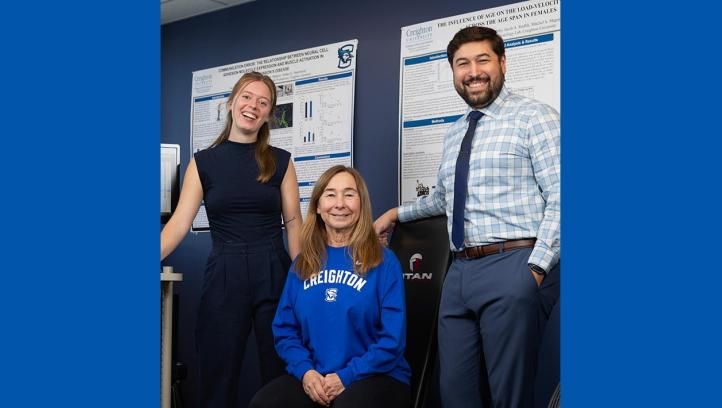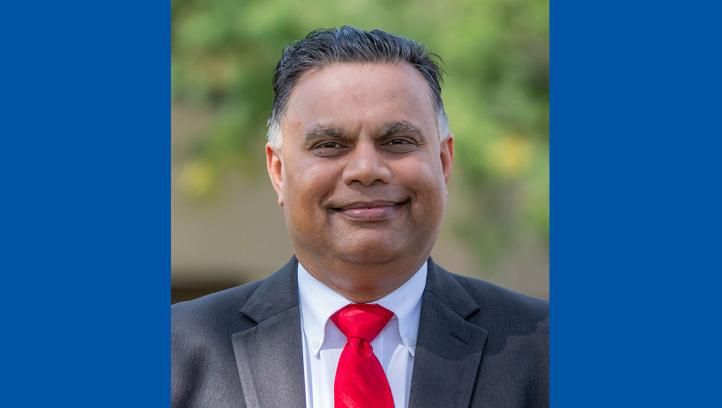
Symposium focuses on collaboration to create healthier communities

Creighton University’s Institute for Population Health hosted its inaugural symposium – Building Bridges for Healthier Communities – Oct. 23-24, with more than 250 online and in-person registrants from Nebraska and Arizona learning from local and national experts about ways to improve health equity and population wellness through professional and community collaboration in the places where they work and live.
Creighton University President the Rev. Daniel S. Henderson, SJ, PhD, noted in his welcoming address that the institute is a strategic investment and the culmination of an aspirational promise years in the making.
“It is an effort that reflects our Jesuit roots and imagines a bold vision for Creighton and higher education at large – one that places the University at the very center of improving our community,” he said. “It is a true expression of the culture of care and commitment we have to the people of Omaha.”
With the Phoenix health sciences campus, and satellite programs in the Dominican Republic, Central Nebraska, Denver and Anchorage that culture and commitment extend to more people than ever.
CyncHealth partnership
Fr. Hendrickson highlighted the generous support of CyncHealth, whose investment in Creighton’s vision for excellence in population health allowed the University to support the work of Scott Shipman, MD, MPH, to build this University-wide institute. Shipman holds the newly created CyncHealth Endowed Professorship in Population Health and is a professor in the Department of Clinical Research and Public Health in the School of Medicine.
Mardell Wilson, provost, spoke about the significant challenges all healthcare professionals face today with widespread disparities in access to care and health outcomes, but noted the opportunity created by the institute to come together to address these disparities and work to improve health equity through policy, training, and engaging as a trusted partner both within the communities the University serves and with the University’s affiliated health systems.
Omaha Mayor Jean Stothert, whose background is in critical care nursing, noted that Omaha gets things done by building partnerships “with our academic, business, development and philanthropic communities, with our state and our nonprofit sector.
“All of us have the opportunity and the responsibility to prepare Omaha for a healthy future,” Stothert said.
“I really cannot think of a better place than Creighton for the establishment of the Institute for Population Health,” said Lindsay Huse, Douglas County Health Department director. “I’m always reminded and impressed that Creighton just gets it.
“They… understand the impact of their work on the community and on social determinants of health; and they have a deep commitment to people and to social justice,” Huse continued. “They understand the importance of connection and collaboration to drive their impact. It’s one of the reasons I love working with Creighton and I am so excited to see what comes next, with the institute service as a fulcrum to leverage not just programs within Creighton, but across the entire community.”
Robert “Bo” Dunlay, MD, dean of Creighton’s School of Medicine reiterated the external opportunities the institute is creating while highlighting the opportunities for medical and other health sciences students to learn more about the burgeoning field of population health and become future leaders in improving health outcomes in the communities where they will serve.
'Building Bridges'
Shipman said that the symposium’s “Building Bridges” them was chosen carefully.
“What we need to … start with is effectively build bridges with the community and community leaders who have long worked in this space; build bridges with the healthcare systems and the leaders there who understand the need to promote and ensure equitable health outcomes,” he said. He then introduced this video which explains his vision for institute.
He said the institute will help amplify the voices work of Creighton and community leaders to help them extend their good work to reach more populations. It will catalyze new work in in the space of promoting health equity, promoting healthcare equity, reducing disparities, improving access and more. The institute will partner with those who are doing new work to help ensure they are successful in their work and to accelerate the pace of change by building an infrastructure to help expedite the transference and generalizability of evidence into action, all while developing new skills in community members, faculty and students – the future workforce across fields – to be more effective as they implement new solutions.
Over the two days, sessions included information about how population health builds healthier communities; what programs and services Creighton currently offers that address population health and health equity; how healthcare leaders use human centered design to bring diverse populations together to identify, brainstorm and iteratively develop solutions to meet a population’s needs by focusing on the end-user’s experience and on engaging stakeholders as those solutions are developed; the importance of partnerships among health systems, social services, schools and universities, policymakers, public health and businesses to address the fundamental social determinants of health; the barriers facing many women in accessing culturally sensitive maternal care and the role of doulas in reducing health disparities and improving mental health outcomes; about Omaha’s multipronged efforts to understand and prevent violence among our youth; how Creighton, CHI Health and the community are supporting better health and well-being for refugees in Omaha; and how urban and rural leaders are working to expand access to care in their communities.




